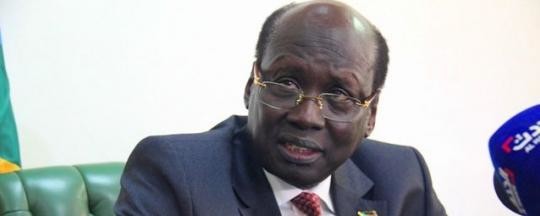Foreign Minister of South Sudan Barnaba Marial Benjamin says that the reservations raised by the government against the recent peace agreement must be addressed or else implementation of the deal will be ‘very difficult’. In an exclusive interview, Barnaba also criticized the mediators for ‘imposing’ the peace deal.
President Salva Kiir signed the agreement but still holding on reservations. What message does this convey? Will the government not implement the peace deal since it holds reservations on key provisions which could derail implementation?
The problems started when US President Barack Obama came to African convened a regional leaders’ meeting in Addis Ababa to discuss South Sudan and President Kiir was not invited. We asked how can regional allies talk about our country without our participation? No answer was given to us and we were left in suspense.
This irritated our people who became disappointed with what happened and we thought that if this is the way things are done at the regional and the African Union level, then we must reassert our independence and dignity, while appreciating the assistance we have been getting from our friendly countries.
How does South Sudan plan to reassert its independence?
The reservations we raised must be addressed or else implementation is going to be very difficult. Some of the things we pointed out had not been discussed and even areas that we had agreed on earlier were not included. There is no country in Africa that can accept an agreement in that form.
When the deal was signed on August 17 in Addis Ababa, we made it clear that the international community was pushing us to sign the deal. We said that we needed to take the document back to our people and consult with our constituents.
IGAD and AU gave us 15 days to consult, but seven days later, the US and the UN Security Council started circulating a document for sanctions and arms embargo. So we were wondering who is in charge – is it IGAD, AU or the Security Council?
Does South Sudan feel let down by IGAD?
Yes, we feel let down because of the attitude of the mediators, who had gone beyond their mandate. The mediators were supposed to bring out issues to the two warring sides and then assist them in areas where they disagree.
But instead, they took over the whole process, drafted the agreement behind the backs of stakeholders and then brought the document saying, take it or leave it.
What type of mediation is this? IGAD should have waited until the most important partner, which is the government, signs the document first and then witnesses sign later in order to make the document authentic.
This is one area where mediators failed. They were not mediating but were just imposing an agreement.
After signing the document, how does the government want it corrected?
Well, we have already signed the document and we are going to the stage of implementation but with reservations. That is why we raised concern over several difficulties that were not discussed by the two parties.
File photo




